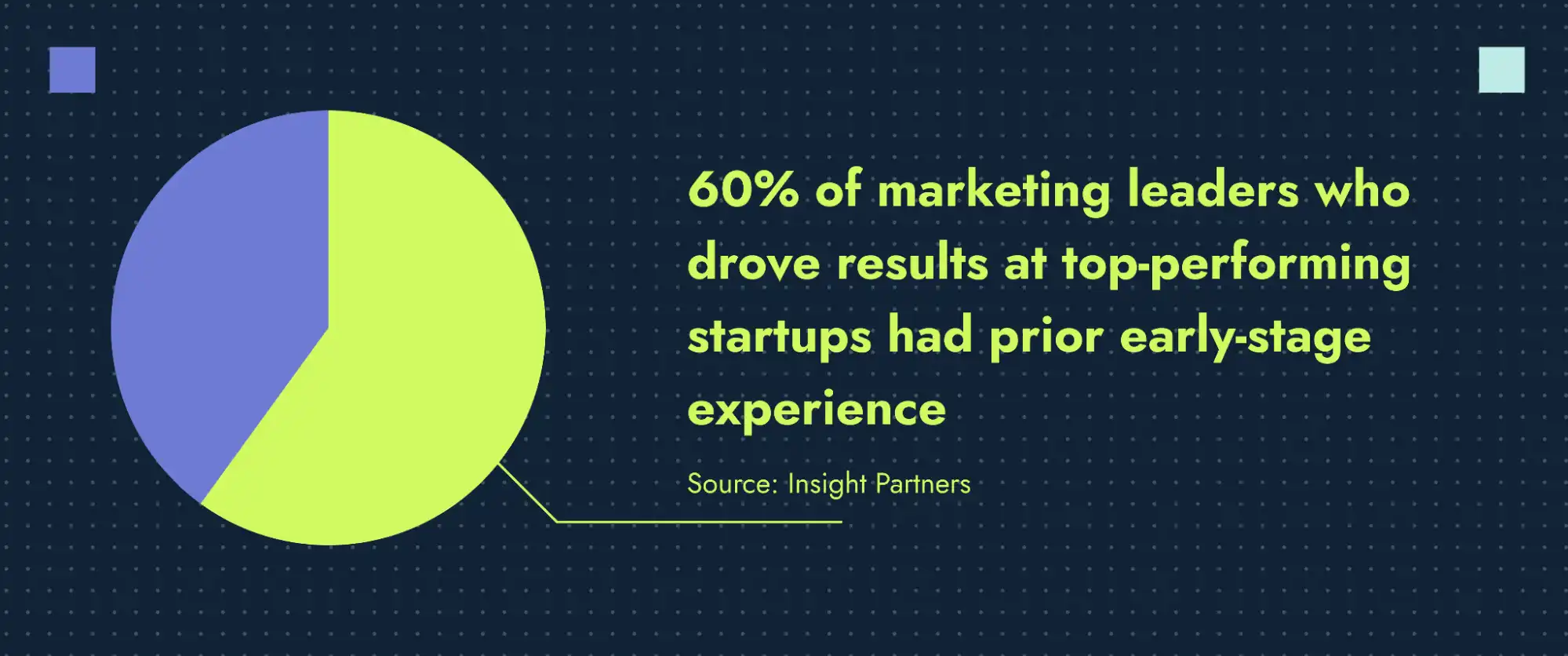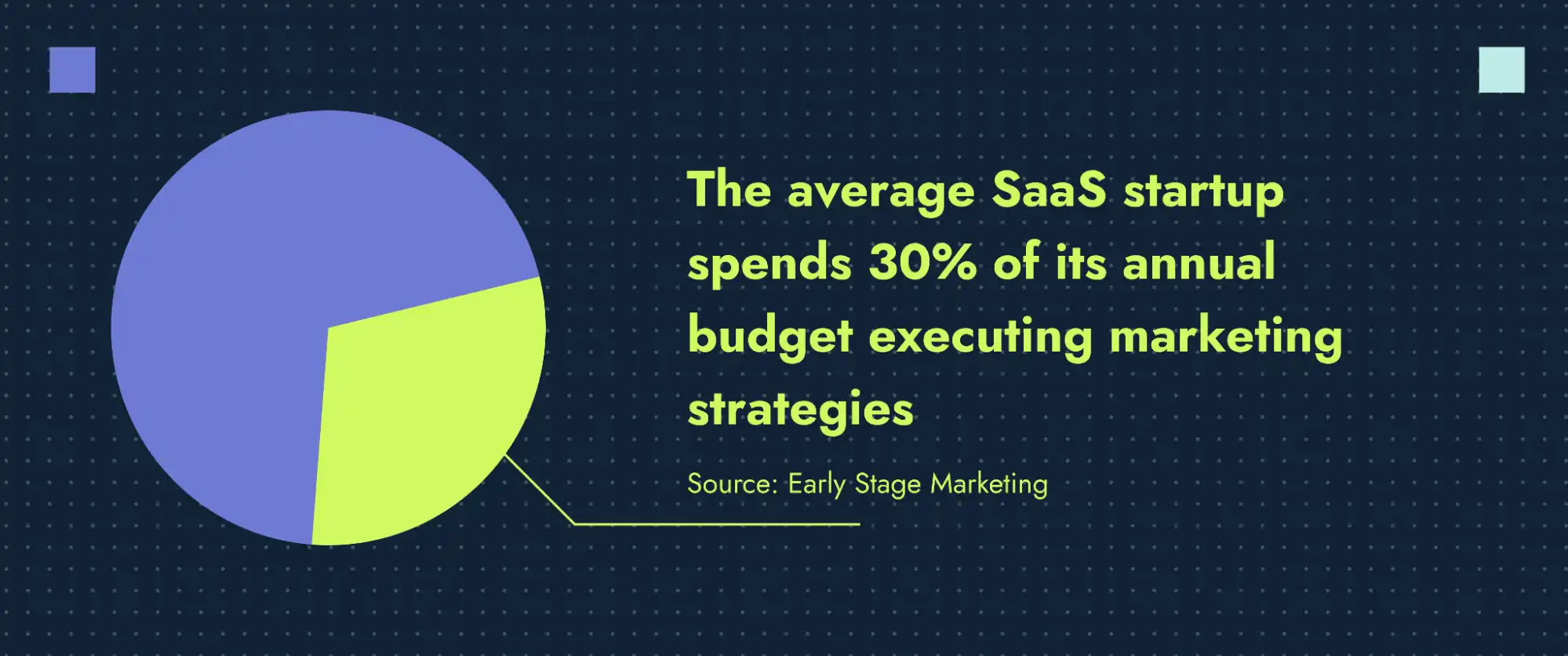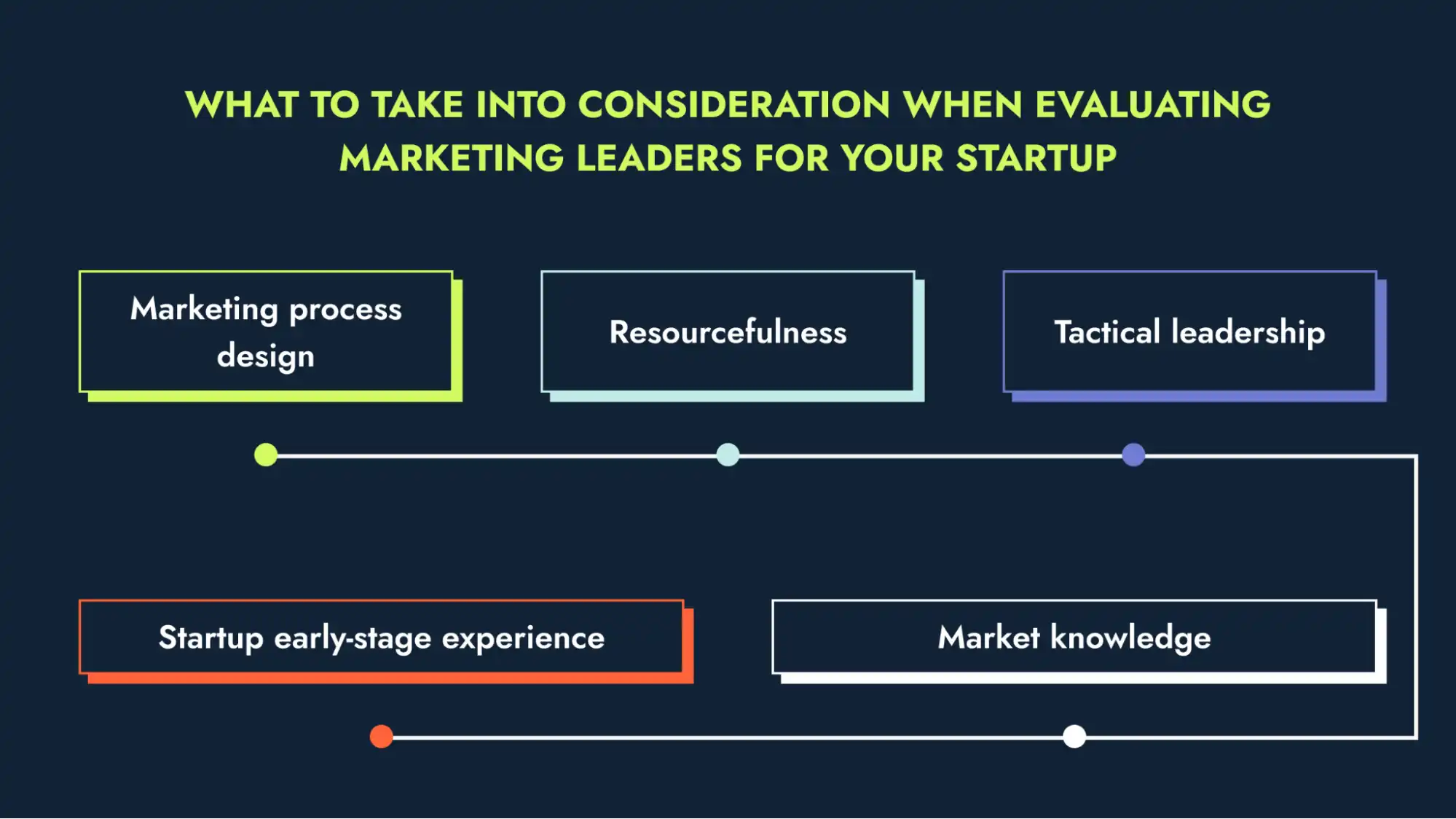As a startup founder, you likely relate to spending countless nights focused on your company’s growth, wearing every hat imaginable. But your time is valuable, and spreading yourself thin can negatively impact your progress, especially if initial momentum begins to plateau or drop. Every founder’s challenge is knowing when to transition from a do-it-all mentality to bringing in specialized talent.
Marketing is a pivotal hire in your early stage — but it’s also one of the trickiest to get right. Should you go for a seasoned CMO with years of experience? A versatile marketing generalist? Or maybe someone hungry to grow alongside your business?
Here’s what I’ve learned working with growing startups: you need someone who not only shares your vision and understands your product but also brings enough expertise to help shape your marketing initiatives without any handholding.
Key insights:
- Successful startups typically hire their first marketing lead role within year one or immediately after securing early funding.
- Research shows that 60% of marketing leaders who drove results at top-performing startups had valuable prior early-stage experience.
- The ideal first marketing hire should effectively balance strategic vision with strong hands-on execution capabilities.
- Market misalignment and poor timing account for 35% of startup failures, making an experienced marketing leader a must-have for driving growth.
Why is marketing essential to startup success?
Research in the Industrial Marketing Management journal found that 45% of B2B startups fail to invest in systematic marketing strategies, with early-stage companies being the most likely to underinvest. Ironically, these same companies stand to gain the most from strategic marketing initiatives.
Marketing, from messaging to visual branding, shapes how customers see your startup. Failing to bring in a marketing role at the right time — a fairly common mistake — or giving control of your brand to the wrong candidate can waste your budget and stunt your startup’s growth.
The right SaaS marketing expertise can set your business up for success by:
- Properly defining your buyer personas, making it easier to target focus areas for your sales team
- Creating compelling content that helps to drive organic engagement, boost outreach efforts and power advertising
- Raising awareness and generating leads, ensuring consistent pipeline growth through strategic follow-up and personalized communication
- Generating demand and improving conversions through data-driven campaigns and optimized marketing channels
When to hire your first marketer
Most SaaS startups’ first focus is sales, not marketing.
The typical story goes like this: through industry experience, you discover a new or better solution and pull together a driven team that believes in your vision. Initially, relying on selling your product or service through your networks is common. As your startup grows, you may notice your sales team facing increasing challenges.
| Issues sales teams encounter | Impact on businesses | How a marketer can enable your sales team |
|---|---|---|
| Lack of brand focus | Teams may struggle to deliver consistent sales pitches without cohesive brand messaging, which can result in lost opportunities. | Develop clear brand guidelines, create standardized sales materials and establish a unified value message sales teams can consistently communicate. |
| Stagnant growth | Sales may slump without a robust strategy for capturing and nurturing new prospects, making it difficult to expand your business. | Implement lead generation programs, create targeted content for different buyer stages and establish marketing automation workflows to nurture prospects. |
| Slow momentum | Expansion and turnover can disrupt sales team momentum, especially if your prospecting relies on individual team members working independently rather than collaboratively with a marketing lead. | Build scalable processes, create reusable marketing assets that reduce reliance on individual expertise and design data-driven systems for lead qualification and handoff. |
At this point, if you’re asking yourself, “Do I need a marketer?” then you most likely do. As Productive Shop founder and CEO, Imran Selimkhanov, points out, most first marketing hires in SaaS startups happen early-stage: “From our experience working with B2B SaaS startups, most successful companies generally make a marketing hire within the first year of operation or after securing early-stage funding.”
An effective marketer can create assets that make life easier for your team, such as:
- Clear product messaging that positions your strengths in the marketplace
- Compelling pitch decks that help your sales team close deals
- Targeted content that addresses common customer pain points
All these marketing assets, in turn, enable you to scale your sales operations.
A marketing manager role can also offer consultative insight to steer your brand’s direction. CBInsights found that market misalignment and poor timing accounted for 35% of total startup failures analyzed. Thorough research from a professional can uncover, diagnose and mitigate these issues before your startup implodes.
Why demand gen is a top priority for marketers
Most startup founders naturally take on the role of managing product-led growth early on — they know the product inside and out and can articulate the value proposition. But once you secure funding, your priority should be demand generation, not product marketing.
Here’s why it’s critical to have a dedicated marketer to lead these efforts. While founders can effectively handle product positioning in the early days, they often struggle with lead generation and customer acquisition, according to a Mayple survey of 1,000 startups.
Early-stage startup marketing roles should be handled by someone who knows how to enhance your brand perception, build awareness of your products and execute demand generation programs, not just refine product messaging.
A demand-focused marketer can help:
- Build a predictable pipeline: Create systematic processes that consistently generate and qualify new sales qualified leads.
- Expand market reach: Develop multi-channel campaigns that extend beyond your network and into new market segments.
- Accelerate sales cycles: Design content and nurture programs that move prospects through your funnel more efficiently.
- Measure and optimize: Implement data-driven systems to track marketing ROI and continuously improve performance.
👉 Keep reading: A CMO’s guide to creating ideal customer profiles (ICP) in B2B
What does a marketer do at a startup?
The role of marketing at a startup is all-encompassing. It transforms your vision and goals into measurable, actionable strategies that drive real-world success. Think of it as an extension of your company’s core mission, translating your “why” into strategies that resonate with your target audience.
A marketing leadership role should manage:
- Strategy development: Define marketing goals and KPIs aligned with business objectives.
- Brand management: Create and maintain brand guidelines, ensuring consistent messaging.
- Lead generation: Design and implement strategies to attract, nurture and convert marketing qualified leads.
- Content creation: Develop and execute editorial calendars across all of your channels.
- Digital marketing: Drive, analyze and refine social media marketing, email and paid advertising campaigns.
- SEO strategy: Optimize web content and implement best practices for search engines.
- Performance analysis: Track marketing KPIs and provide regular performance reports.
The right candidate will tackle these challenges head-on, building a foundation for sustainable growth. While there isn’t a “right time” set in stone, consider that early marketing decisions have a compounding impact on your business.
How startup marketing roles are defined
The first marketing hire shapes a company’s story at a fundamental level. They aren’t just executing campaigns — they’re architecting how the market will perceive your product for years.
The key is deciding what type of marketing role you need. A junior hire likely lacks the experience and confidence to make these critical early-stage decisions. In contrast, a senior hire, such as a Chief Marketing Officer (CMO), brings a more holistic skill set from past roles and can build systems that scale rather than ad-hoc tactics that aren’t sustainable.
As a first hire, you’ll want to find a leader who can manage day-to-day tasks typical of a specialist role but can build and scale an entire team as you grow. Here’s how to approach the process of creating your first marketing role:
1. Build a role that fits the stage of your startup
Insight Partners shows that 60% of marketing leaders who drove results at top-performing startups had prior early-stage experience. A lead who helped scale a company from seed to series A brings invaluable pattern recognition to a seed-stage startup. They’ve recently solved similar challenges — from establishing brand positioning to building content systems — while maintaining the scrappy mindset needed for early execution.
A marketing hire’s recent experience can help them provide specific playbooks, such as “Here’s what worked when we faced this exact challenge last year,” rather than relying on dated enterprise strategies. This stage-specific experience combines the right mix of strategic foresight and hands-on capability needed in early-stage environments.
The right person will ideally:
- Have worked at a company similar to yours but a stage or two ahead, for example, hiring for the seed stage from series A or series B
- Demonstrate knowledge in demand generation or product marketing with well-rounded marketing expertise
CMO playbook for SaaS leaders
Everything you need to know to make an impact in your first 90 days
Understand the scope of marketing leadership roles
When making a first marketing hire, companies often make the mistake of searching for candidates who excel at everything: product marketing, demand generation, brand building and marketing team leadership. However, finding someone strong in all areas is challenging and often counterproductive. Different startup growth stages require different priorities and marketing competencies.
Here’s how marketing needs to evolve as your business scales:
| Startup stage | Marketing focus | Marketing goals | Required experience |
|---|---|---|---|
| Early stage |
|
|
|
| Growth stage |
|
|
|
| Late stage |
|
|
|
3. Establish a startup marketing budget
Your first startup marketing hire needs resources to drive results, and those resources start with a clearly defined budget. By aligning your spending with your startup’s stage and revenue, you’ll give them a clear framework to plan and execute effectively.
Your marketing budget will dictate how to execute your strategy, so getting it right sets your hire up for success. Before bringing on a leader, consider both your team and campaign costs. For example, a candidate who previously managed a $50M budget may struggle to execute their strategies with financial constraints.
According to Early Stage Marketing, the average SaaS startup spends roughly 30% of its annual budget on marketing. However, that number fluctuates based on their stage. Early stage (<$100k ARR) spend closer to 10%, while the growth stage can reach up to 50%. Additionally, research by Insight Partners shows that companies with large deals ($75K+ ASP) spend $0.42 to generate $1.
Selecting the right marketing candidate for the role
Unlike established companies, startups need to prioritize a first marketing hire who can build everything from scratch while balancing strategic thinking with hands-on execution. Equally important is their fit to your company culture — solving today’s challenges while possessing the drive to evolve along with your business.
Paddle’s Andrew Davis shares great insights on the importance of fit, which might require considering not only the marketer’s profile but also the team’s or founder’s profile.
So how to get started? By focusing on these five areas during the hiring process, you’ll be better equipped to find a leader to drive your startup’s growth.
1. Full-scale process design
Many marketers excel at optimizing existing systems, but startup marketers generally need to create them from scratch. Evaluate this capability through scenarios like: “Walk me through how you’d build our marketing infrastructure in the first 90 days. What systems would you prioritize and why?”
Look for answers that:
- Start with clear prioritization based on business impact
- Show experience selecting and implementing marketing tools within budget constraints
- Demonstrate an understanding of how their choices now will affect scalability later
Watch out for candidates who focus exclusively on enterprise-level tools without budget considerations, struggle to articulate specific implementation steps or demonstrate an over-reliance on large team structures. Remember, as you don’t have concrete documentation or processes, your first hire should be a doer who can adapt quickly and roll up their sleeves to get things done.
2. Resource-constrained strategy
Startup marketers need to achieve results with limited resources. When interviewing a candidate, you can test their resourcefulness with questions like: “If you had $10,000 for your first quarter, how would you allocate it to start generating leads?”
A successful candidate should demonstrate:
- Creative approaches to maximizing limited budgets
- Experience with low-cost, high-impact channels
- Clear metrics for measuring marketing ROI
- Understanding of what you can do in-house vs. outsourced
Be wary of any candidate who proposes solutions requiring significant spending, cannot discuss specific costs and tradeoffs or lacks experience working with tight budgets.
3. Tactical leadership
Your marketer needs to be more than just a strategic thinker. Not only will they be developing a detailed plan, but they will also be executing and analyzing its success. Probe with questions such as, “Tell me about a successful campaign you executed from start to finish. What was your direct involvement in each phase?”
The answers you receive from the potential leader should prove:
- Detailed involvement in hands-on work (writing, design, analytics)
- Experience managing external vendors when needed
- Ability to switch between strategic and tactical thinking
Be cautious of candidates who only discuss oversight rather than execution, lack basic technical skills in design, writing and analytics or show discomfort with hands-on work.
4. Stage-appropriate experience
Through questions like “What’s the earliest stage company you’ve worked at?” and “What would be your first three priorities?”, evaluate candidates for both startup experience and stage alignment.
Look for candidates who demonstrate direct pre-Series A startup experience, understand the challenges of product-market fit, show comfort with ambiguity and can articulate stage-appropriate priorities with realistic resource expectations. At the same time, watch out for those who only have enterprise experience, expect structured processes, resist wearing multiple hats or propose solutions that work at larger companies but won’t scale down to your stage.
5. Understanding of the market
Though a marketer professional may have all the stage-appropriate experience you’re looking for, there can still be an industry mismatch. For example, a candidate who may have answered your exact challenges within a renewable energy startup may not have the insights to manage an AI-powered accounting product. You also want to evaluate their ability to grasp and contribute to your market quickly by asking questions like, “How would you position our product against [specific competitor] in this market?”
A strong, adaptable team leader should have:
- Research done before the interview, which should become obvious in their answers
- Understanding of the unique and distinct challenges in B2B vs B2C marketing
- Ability to identify key differentiators quickly
Listen closely, avoiding moving forward with candidates who display only surface-level market understanding, can’t discuss specific competitor positioning or lack the marketing experience necessary to position your product or service. For example, an experienced B2C marketer may not fully grasp the nuanced approach required to launch a 2B SaaS product.
Finalizing your first marketing lead decision
Once you’ve evaluated candidates across the key areas above, it’s time to test their abilities. Remember: 60% of successful marketing leaders have prior early-stage experience. Therefore, you need to find someone who can demonstrate their capabilities — not just talk about them.
Here are four practical evaluation methods to implement:
- Mini project: Ask candidates to create a 90-day marketing plan with a specific budget constraint and growth targets aligned with your stage.
- Team presentation: Have them present their strategy to key stakeholders, demonstrating strategic vision and hands-on execution capabilities.
- Technical assessment: Test their capabilities in areas they’ll need to execute themselves, such as writing compelling product messaging, basic design work and analytics implementation.
- Reference checks: When speaking with past employers, specifically ask about their ability to execute with limited resources, experience building systems from scratch and examples of effectively wearing multiple hats.
Your first marketing hire shouldn’t just be a good marketer — they need to be a good startup marketer. Look for candidates with the strategic vision to build your brand and the tactical skills to execute day-to-day tasks.
More resources for startup founders:
🏷️ How to manage a software development team
🏷️ Your pilot guide on extending your startup runway
🏷️ How to run a lessons learned session for a SaaS startup
🏷️ Business traction 101 for growth startups
Make Productive Shop your first call as a new marketing lead
We work with startups every single day — and very often our team is one of the first calls a new startup marketing hire makes. Why? Because we can become their entire marketing department — from building their SEO lead generation program and outputting content assets to coding and designing their website.
With a laser focus on the B2B SaaS market, our approach is results-driven, and we have a proven track record of providing our clients with measurable growth. Cybersecurity startup SaaS Alerts, for example, achieved an 85% increase in organic traffic and a 113% boost in trial signups when partnering with us for website optimization and content creation.
👀 Explore our B2B case studies.
Focus on growing your business while my dedicated team streamlines your marketing operations with:
- SEO expertise that amplifies your brand and drives organic results on autopilot
- Web development and design services that deliver performance-first websites optimized for both users and search engines
- Strategic B2B SaaS content creation that turns your blogs into appreciating digital assets ranking for business-critical keywords and enabling your sales team
- Digital marketing strategy that complements organic strategies for maximum impact
The first step is booking a meeting with us. Tell us your marketing needs, and let’s start the conversation.
Frequently asked questions
What are the first startup roles that generally get hired?
The first positions in a startup are crucial for establishing core operations and driving growth. Typical key roles include:
- CTO or Lead Engineer
- Product Manager
- Sales/Business Development Manager
- Marketing Manager
- Operations Manager
How much do startups pay for marketing hires?
Marketing salaries in startups vary by role, location and experience.
- Based on an analysis by Kruze Consulting, compensation for manager-level roles ranges from $66k–$123k in the United States, rising to $80k–$175k within seed-stage startups.
- According to research by The CMO Club, compensation for senior and leadership positions ranges from $150k-$325k in major tech hubs like San Francisco.
How much startups should invest in marketing?
According to insights from Gartner’s 2024 CMO Survey, the average marketing budget is 7.7% of overall company revenue, down from 9.1% in 2023. For perspective, if your startup generates $1 million in revenue, you’d typically allocate around $77,000 to marketing initiatives, though this can vary significantly based on your growth stage and industry, as early-stage startups often need to invest more aggressively in marketing to gain market share and build brand awareness.
* Edited by Riley Wallace











